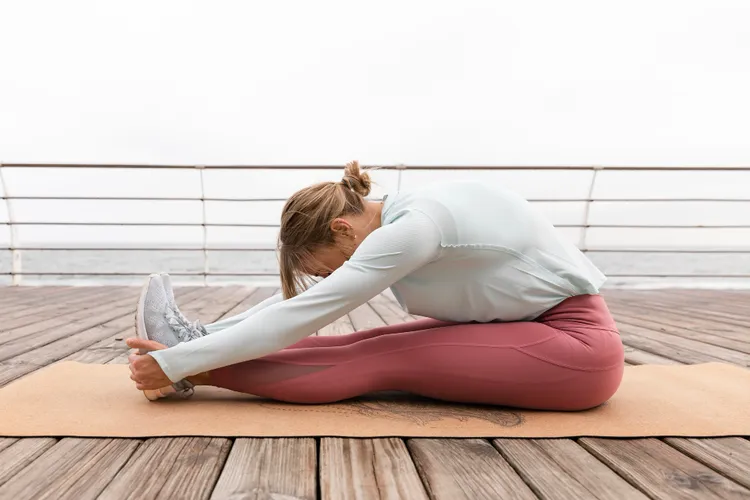10 Powerful Benefits of Stretching Every Day - How It Transforms Your Body and Mind
In a world that never stops moving, our bodies often bear the brunt of long hours spent hunched over desks, slouched on couches, or standing for hours. While workouts and healthy diets get most of the spotlight, there’s an often-overlooked practice that can completely transform your body and mind: stretching.

Most people associate stretching with a prelude to exercise or a quick morning yawn and reach. But what happens when you stretch every single day - intentionally and consistently? The effects might surprise you.
Let’s dive deep into the science-backed and experiential transformations your body goes through when you commit to daily stretching.
1. Improved Flexibility: The Obvious Yet Powerful Benefit
What Happens:
One of the first changes you’ll notice is increased flexibility. Stretching lengthens your muscles and tendons, improving your range of motion and reducing stiffness. Over time, this can significantly impact how you move, walk, and perform daily tasks.
Why It Matters:
-
Prevents injury: Flexible muscles are less prone to tears and strains.
-
Enhances performance: Whether you're lifting weights, practicing yoga, or just reaching for the top shelf, better flexibility makes movement more efficient.
-
Slows down aging: Flexibility naturally declines with age, but stretching can slow this progression.
2. Better Posture and Spinal Alignment
What Happens:
Tight muscles, especially in the hips, chest, and shoulders, can pull your body out of alignment, leading to poor posture. Stretching these areas can help realign the spine and balance muscle tension across your body.
Why It Matters:
-
Reduces back and neck pain
-
Improves breathing (posture directly impacts diaphragm function)
-
Makes you look more confident and feel more energized
Bonus: Stretching the hip flexors and hamstrings, in particular, helps correct the common postural issue known as anterior pelvic tilt.
3. Increased Blood Flow and Circulation
What Happens:
Stretching boosts circulation by opening up blood vessels and allowing oxygen-rich blood to flow more freely. This not only nourishes your muscles but also helps with waste removal like lactic acid buildup.
Why It Matters:
-
Faster recovery from workouts
-
Reduced muscle soreness
-
Healthier heart and vascular system
Some studies have even suggested that regular stretching can help lower blood pressure and improve vascular function in the long term.
4. Greater Joint Health and Range of Motion
What Happens:
Your joints rely on synovial fluid and strong, pliable connective tissues to move freely. Stretching keeps these tissues elastic and promotes the production of synovial fluid, which acts as a lubricant.
Why It Matters:
-
Reduces risk of arthritis and joint degeneration
-
Supports healthy aging
-
Improves athletic performance
Daily stretching keeps joints mobile and strong, which is especially important as we age or recover from injuries.
5. Less Pain, Especially Chronic Pain
What Happens:
Stretching targets tension buildup and muscle imbalances that are often the culprits behind chronic pain - especially in the lower back, hips, and neck.
Why It Matters:
-
Reduces the need for painkillers
-
Improves quality of life
-
Enhances physical and mental resilience
People with conditions like sciatica, fibromyalgia, or herniated discs often find daily stretching to be a natural, low-impact therapy.
6. Enhanced Coordination and Balance
What Happens:
Stretching activates and strengthens your proprioceptive system - your body’s ability to sense movement, action, and location.
Why It Matters:
-
Reduces risk of falls (especially important for older adults)
-
Boosts performance in activities like yoga, dancing, and sports
-
Increases mindfulness and awareness of your body
This is particularly true when you combine static stretching with dynamic stretches and balance exercises.
7. Stress Reduction and Mental Clarity
What Happens:
Stretching has a calming effect on the central nervous system. Deep breathing during stretching sends signals to the brain that it’s time to relax, leading to a reduction in stress hormones like cortisol.
Why It Matters:
-
Improves mood
-
Combats anxiety and depression
-
Enhances focus and mental clarity
Think of stretching as a moving meditation. It gives you space to reconnect with your body and slow down a racing mind.
8. Better Sleep Quality
What Happens:
Tension in your body can keep you awake at night or cause you to toss and turn. Stretching before bed helps relax the muscles, calm your mind, and prepare your body for a restful sleep.
Why It Matters:
-
Deeper, more restorative sleep
-
Less waking up with stiffness or pain
-
More energy the next day
A gentle nighttime stretching routine - especially focused on the neck, shoulders, and hips - can be a game-changer for insomniacs.
9. Increased Energy and Vitality
What Happens:
By improving circulation, posture, flexibility, and mental clarity, daily stretching naturally leads to greater energy levels and a feeling of being more “alive” in your body.
Why It Matters:
-
No more afternoon slumps
-
Improved motivation to move
-
A sense of lightness and agility
Unlike caffeine or sugar, this energy is sustainable and rooted in real physiological change.
10. You Build a Stronger Mind-Body Connection
What Happens:
The act of tuning into your body through stretching heightens awareness of how you feel physically and emotionally. It promotes mindfulness, emotional regulation, and self-compassion.
Why It Matters:
-
Increased body confidence
-
Greater intuitive eating and exercise habits
-
Enhanced self-awareness and presence
Many people find that stretching is their gateway to yoga, meditation, or other mindful movement practices.
Tips for Making Daily Stretching a Habit
-
Start small: 5-10 minutes a day can make a huge difference.
-
Be consistent: Daily is ideal, but even 4-5 days a week yields great results.
-
Stretch when warm: After a shower or workout is best to avoid injury.
-
Breathe deeply: Don’t hold your breath - inhale and exhale to go deeper.
-
Listen to your body: Never stretch to the point of pain - only tension.
Is Stretching Daily Worth It?
Absolutely.
Daily stretching may not be flashy. It won't spike your heart rate or torch calories like a HIIT session. But its benefits are profound, long-lasting, and holistic. From improved posture and flexibility to reduced stress and better sleep, stretching helps you build a stronger, healthier, more balanced body - and a clearer, calmer mind.
So the next time you roll out of bed or finish your workout, take a few extra minutes to stretch it out. Your body will thank you. Every. Single. Day.
Bonus: Simple Daily Stretching Routine (10 Minutes)
-
Neck rolls - 1 min
-
Shoulder stretches - 1 min
-
Cat-cow stretch - 1 min
-
Standing forward fold - 1 min
-
Hip flexor lunge - 2 min (1 min each side)
-
Seated hamstring stretch - 1 min
-
Spinal twist - 2 min (1 min each side)
-
Child’s pose - 1 min
Stretch daily. Live fully.









